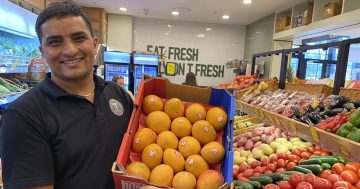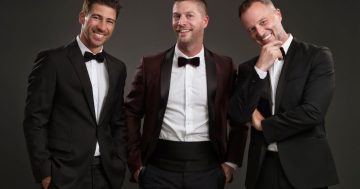
Alf Wheeldon in front of the family’s mixed business in 1937 before it was named the Blue Emperor. Vegetables and fruit were displayed in the front windows. The Empire Takeaway’s glass and aluminium frontage stands there today. Photo: Wheeldon family collection.
During World War II in Papua New Guinea and New Britain a resourceful shopkeeper’s son from Goulburn grew fresh produce for the allies’ military hospitals. Aware of the vital role he was playing, the Japanese regularly bombed his garden plots, but with the help of Papuan natives, Alf Wheeldon prevailed.
Alf filled idle moments netting some of the islands’ spectacular butterflies including stunning blue emperors whose ocean blue wings were fringed with black and splashes of white. He turned his mounted collections into glass-topped carry trays.
“After the war, he told me he had loved it so much up there he wished he could have stayed,” his son Paul said.
On his return to Goulburn in 1946 Alf bought the shop which his family had been renting at 356 Auburn Street. Naming it the Blue Emperor, he had two blue butterflies painted on its frontage.
A mixed business fruit and veg shop also selling confectionary and milkshakes, the Blue Emperor stood opposite the Hoyts Theatre. Movie intervals would see customers streaming in asking for the Wheeldons’ homemade ice blocks which had a secret ingredient: cream.
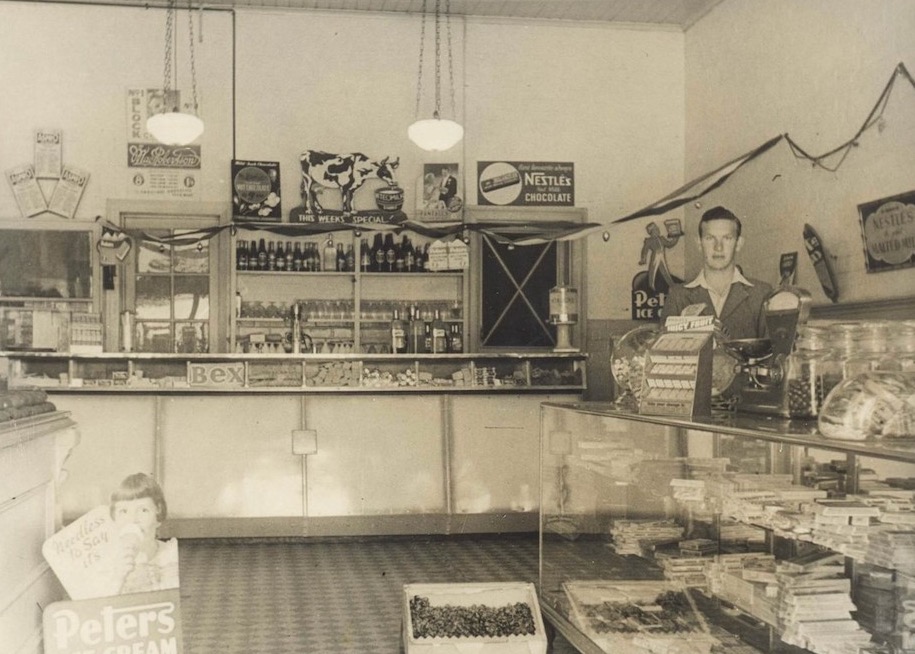
A 1938 photograph of the interior of Wheeldon’s shop, and Alf standing on the right. Photo: Wheeldon family collection.
For that winning flavour they could thank Paul’s grandmother Gertie. From Boorowa, she came to Goulburn after marrying his grandfather George Wheeldon, who once sold fruit and veg from a horse and cart. They would mash up overripe, unsalable bananas in trays and before freezing them into ice blocks, Gertie added fresh cream, saying it would enrich the taste. Customers couldn’t get enough of them.
“On a hot day the nurses from the base hospital would come down with an Esky and say, ‘Could we have 30 ice blocks, please?” Paul said. When other fruit like strawberries became overripe they were turned into creamy ice blocks too.
On the shop’s right was Hayhoe’s Butcher shop with a tiled interior and sawdust-covered floor. “(Butcher) Jack Hayhoe and his wife Phyllis had three children. Their second boy was Bob, a great sportsman and a champion swimmer who became a wool classer,” Paul said.
On the other side in a narrow shop, watchmaker Jim Hubbert used to sit in a chair high up looking onto the street while mending watches.
Paul and his sister Robyn, Alf and their mother Lillian and grandparents lived above the fruit and veg shop. Along with other Auburn Street traders and their children they gathered on their awnings to watch Lilac Time parades go by.
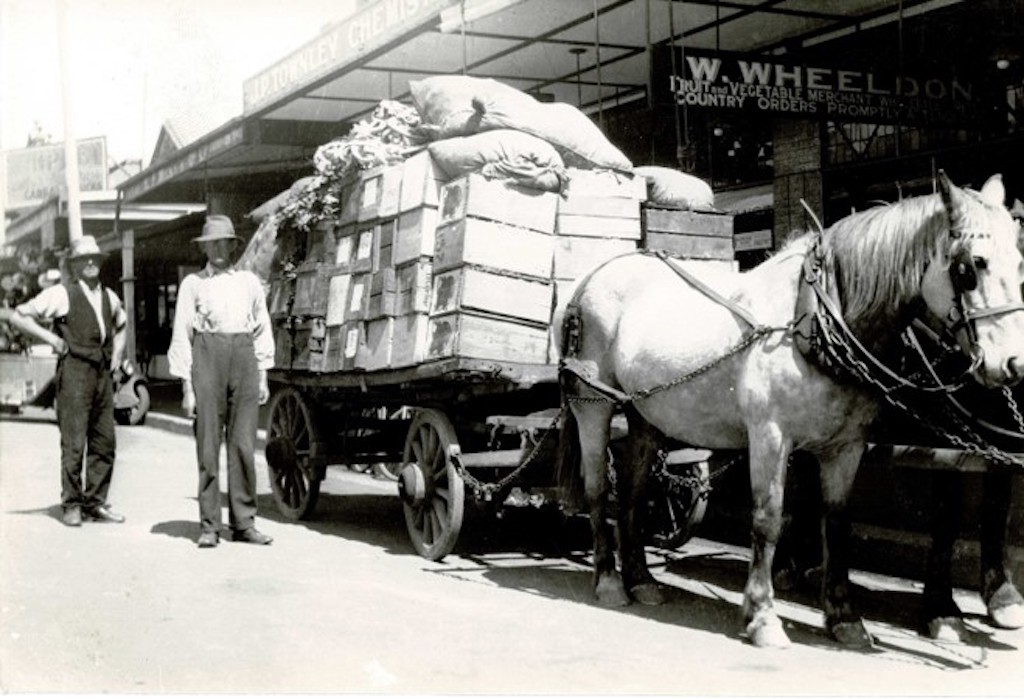
A delivery of fruit and vegetables to Paul Wheeldon’s great-grandmother Winifred Wheeldon’s shop at 114 Auburn Street in the 1930s. The horse and cart would have been loaded at the railway station and delivered to the shop, as was the case when Paul’s father had his shop at 356 Auburn Street. Photo: Wheeldon family collection.
Each Tuesday morning Paul and his father rose at 4 am to catch a train to Sydney where Alf bought fruit and veggies at Paddy’s Market. After paying for the previous week’s produce, he would order more for the week ahead to be dispatched later by train. Then he battled tiredness waiting to catch the Spirit of Progress train that afternoon.
“He needed somewhere he could put himself down and not wander around all day,” Paul said. “We’d go off to the pictures, of course there were quite a lot of picture theatres in Sydney too. I really enjoyed it, ‘Oh yes, this is a day out, fantastic, out of Goulburn, down to Sydney’. We’d go to the pictures and my father would fall asleep. I’d have to keep an eye on the time in order for us to get back to Central Station,” he said.
Soft-natured, Alf nevertheless kept his focus on the business and had no time to get his children into sport. “We never went on holidays. Ever,” Paul said. “His frame of mind was that if you haven’t got the shop open you can’t expect to make money.” They opened seven days a week, including on Christmas morning when they shut at noon.
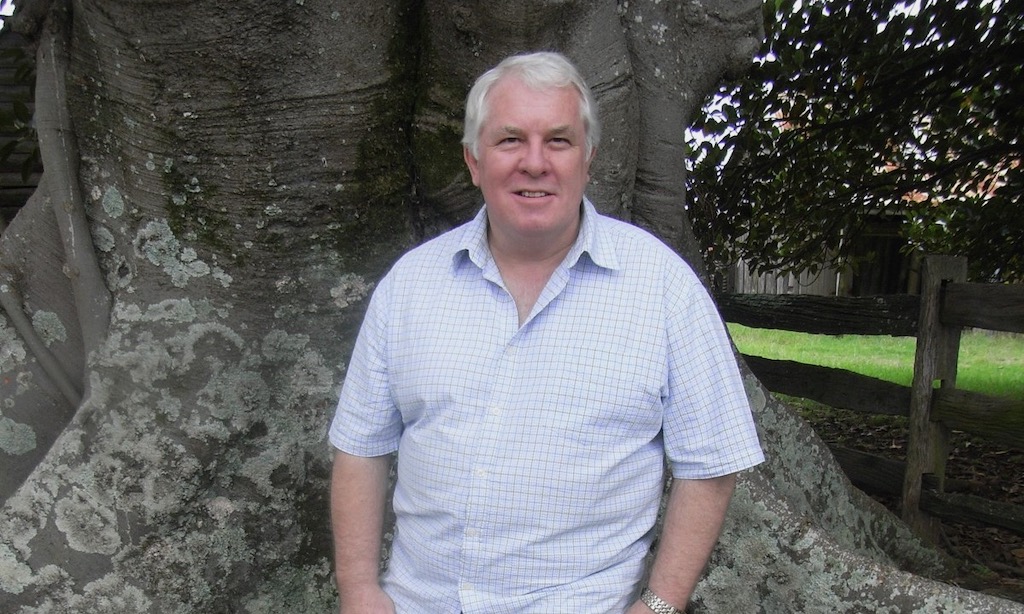
Paul Wheeldon grew up in his parents’ shop, moved to Sydney in 1973, and later to London to work for 10 years, before returning and later resuming work for the University of Sydney. Photo: Wheeldon family collection.
To stock up with extras Alf and Paul called out to the Chinese market gardens near Thorne’s Bridge and The Towers south of Goulburn. “We got quite friendly with the Chinese,” Paul said. He was invited to sample their cooking and enjoyed similar invitations from Greek owners of nearby businesses.
His family had seen the Hoyts Theatre being built. Paul came to know the theatre’s manager Nora Lewsham and once begged her until she relented and gave him a Lawrence of Arabia poster. His father provided extra seats for moviegoers when the Hoyts was packed out. Sadly, the Wheeldons watched as the Hoyts was demolished in the late 1970s. They sold the business in 1982 when Alf and Lil retired.







